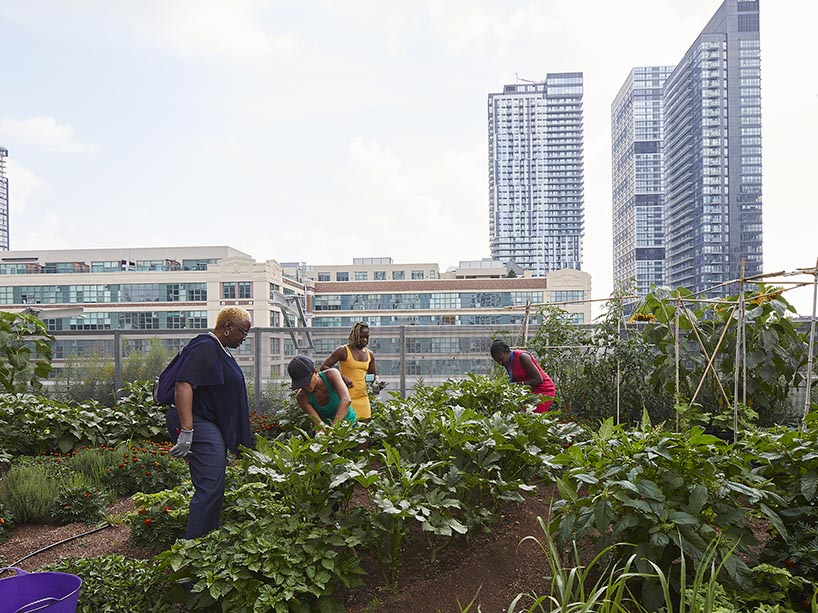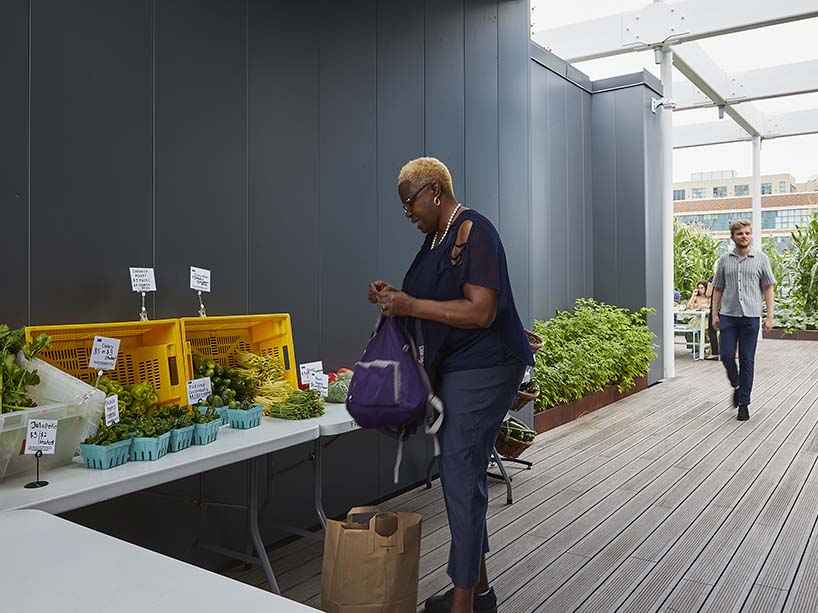Urban Farm brings Black community together through food

The Harvest Collective and Learning Circles will run until September for Black community members to come together and enjoy culturally significant foods while learning about Black-centric food production.
Few things bring people together more than food, and the Urban Farm at Toronto Metropolitan University (TMU) is fostering community healing through its summer programming for Black students, faculty and staff.
Throughout the summer months, the Black Food Sovereignty Initiatives at the Urban Farm welcome Black community members to enjoy culturally significant crops and medicines from across the African diaspora, learn more about Black food history and the contributions of Black communities to food systems, and challenge racism in food production.
“The space is designed in a mandala garden design, so it’s circular,” said Nicole Austin, Black-led programs coordinator at the Urban Farm, who graduated from TMU’s Nutrition and Food program. “That was intentional because I want people to feel that they can walk into the space, smell, touch, taste and really engage with what is growing around them.”
“There’s obviously a lot of diversity within the Black community and we try to be as representative as we can in the food that we grow. We get feedback from the community and grow something new every year,” Austin said.
She started with planting food that she grew up eating in her Jamaican household, such as callaloo, okra, scotch bonnet peppers and scallions.
“This year, we’re growing Ethiopian mustard greens or Ethiopian kale. Someone suggested we grow food that they enjoyed eating in East Africa and I’m really excited about it – it’s a very nice, tender green,” Austin said.
Other crops growing at the rooftop farm include water leaf, enjoyed throughout West Africa especially in Nigeria, long beans, thyme, fever grass (also known as lemongrass), purple hyacinth beans and buena mulata peppers that change from purple to orange to red as they ripen.
“People come in and see the okra, scotch bonnets or the Ethiopian kale growing, and it really moves them to see their food represented. Because, as we know, food brings people together. It nourishes, it heals. You can celebrate around food.”
– Nicole Austin, Black-led Programs Coordinator at the Urban Farm
‘Bankra’ harvest share and learning circle
Starting Friday, August 9, members of TMU’s Black Faculty and Staff Community Network can participate in the new Bankra Basket Harvest Share program. ‘Bankra’ is the Jamaican patois word for basket and originates from the Akan peoples who live in Ghana and the Ivory Coast.
Each bankra will include enough fresh seasonal produce for one or two people to enjoy throughout the week.
The Learning Circle program offers experiential workshops to engage the Black community and explore Black food sovereignty in action. It covers topics such as Black food history, food and climate justice, food literacy and the connections between nutrition and food, physical health and mental well-being.
Learning circles take place the third Friday of each month. Space is prioritized for youth, students and community members who self-identify as Black, and anyone who self-identifies as First Nations, Inuit or Métis.
For more details on both summer events, visit the Black Food Sovereignty Initiatives page.

The Harvest Collective initiative welcomes members of TMU’s Black Faculty and Staff Community Network to share in the harvest of crops enjoyed across the African diaspora.
The four pillars of Black Food Sovereignty
The Urban Farm’s work is critical in advancing the mission of the Black Food Sovereignty Alliance of Toronto that operates out of TMU’s Centre for Studies in Food Security and falls within the City of Toronto’s Confronting Anti-Black Racism (CABR (external link) ) Unit.
“We are the first intentional urban farm that's growing food in celebration of and to expand Black food sovereignty,” Austin said. “We take a ‘3B approach’ to our work: Black-led, Black-mandated and Black-serving. It’s premised on the idea of nothing about us without us, and we lead what we need in our community.”
The program is grounded in four key pillars:
- Food literacy (access to nutritious food, meal planning and food budgeting, health, disease prevention and food as medicine)
- Food and social justice (food policy advocacy, representation in local food systems, equity in accessing spaces, confronting anti-Black racism)
- Environmental stewardship (ecology, environmental healing, regenerative farming, rooftop farming knowledge mobilization)
- Community healing (inclusivity, knowledge reclamation, sense of belonging)
“The community healing piece is really important,” Austin said. “Growing culturally significant crops resonates with people and helps them heal because we’re bringing the community together. We’re bringing them together in spaces where they have historically been excluded or not had access to.”
The summer events at the Urban Farm are an important part of food sovereignty because they help reclaim knowledge, prevent knowledge from being lost and share knowledge that people might not have had access to before.
Learn more about Black-centred initiatives at TMU in the Cultivating Black Flourishing Report. Published by the Office of the Vice-President, Equity and Community Inclusion, the report offers a platform to reflect on the university’s progress in confronting anti-Black racism and an opportunity to chart the road to Black flourishing ahead.
